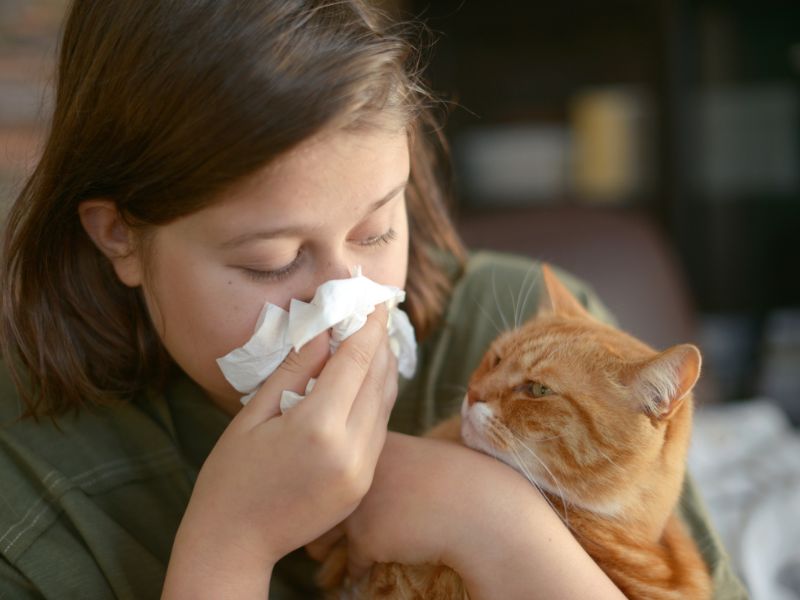Are you a cat lover who has recently developed a mysterious allergy? You’re not alone. Many individuals find themselves suddenly experiencing symptoms like watery eyes, sneezing, and even difficulty breathing when in the presence of these furry felines. But can you really become allergic to cats out of the blue? In this informative article, we’ll explore the fascinating world of allergies and shed light on the possibility of developing a late-onset cat allergy. From understanding the science behind allergies to exploring potential triggers, we’ll uncover the truth behind this perplexing phenomenon. So, if you’ve found yourself in the unfortunate position of being unable to enjoy the company of these adorable companions, join us as we delve into the question: can you suddenly become allergic to cats?
Understanding Allergies: What Happens When You’re Allergic to Cats?
Allergies are a common immune system response to substances that are typically harmless. When your immune system recognizes a particular substance, known as an allergen, as a threat, it triggers an allergic reaction. The immune system releases chemicals, such as histamines, which cause the symptoms associated with allergies. In the case of cat allergies, the immune system reacts to proteins found in the cat’s saliva, urine, and dander.
When you come into contact with these proteins, your immune system mistakenly identifies them as harmful invaders. It then produces antibodies called immunoglobulin E (IgE) to fight off the perceived threat. The next time you encounter the allergen, your immune system releases histamines and other chemicals, leading to the characteristic symptoms of a cat allergy.
It’s important to note that not everyone who comes into contact with cats will develop an allergy. Some individuals may have a genetic predisposition to allergies, while others may develop an allergy over time due to repeated exposure to the allergen.
Can You Suddenly Become Allergic to Cats?
The short answer is yes, it is possible to suddenly develop an allergy to cats, even if you have previously been able to tolerate them without any issues. In some cases, individuals who have lived with cats for years may suddenly find themselves experiencing symptoms of a cat allergy.
The reason behind this sudden onset of allergies is still not fully understood. It is believed that repeated exposure to the allergen can trigger the immune system to develop an allergic response. Additionally, changes in the immune system, hormonal fluctuations, or other environmental factors may play a role in the development of late-onset allergies.
Common Symptoms of a Cat Allergy
If you suspect that you may have developed a cat allergy, it’s essential to be aware of the common symptoms associated with this condition. These symptoms can vary in severity and may include:
- Sneezing
- Runny or stuffy nose
- Itchy or watery eyes
- Coughing
- Wheezing or difficulty breathing
- Skin rash or hives
- Itchy throat or ears
These symptoms typically occur shortly after coming into contact with cats or being in an environment where cat allergens are present. If you experience any of these symptoms, it’s crucial to consult with a healthcare professional for a proper diagnosis.

Causes Of Sudden Cat Allergies
While the exact cause of sudden cat allergies is still not fully understood, several factors may contribute to their development. These include:
- Increased exposure to cat allergens: If you’ve recently moved to a new home where cats are present, or if you’ve started spending more time in environments with cats, your increased exposure to cat allergens may trigger an allergic response.
- Changes in the immune system: As we age, our immune system undergoes changes. These changes can sometimes lead to the development of new allergies or the worsening of existing ones.
- Hormonal fluctuations: Hormonal changes, such as those that occur during pregnancy or menopause, can affect the immune system and potentially trigger the onset of allergies.
- Environmental factors: Other environmental factors, such as pollution or exposure to other allergens, may also contribute to the development of sudden cat allergies.
It’s important to note that while these factors may increase the likelihood of developing a cat allergy, they don’t guarantee that you will develop one. Each individual’s immune system responds differently, and some people may remain unaffected even with increased exposure to cat allergens.
Diagnosing A Cat Allergy
If you suspect that you have developed a cat allergy, it’s essential to seek a proper diagnosis from a healthcare professional. They will typically perform a comprehensive evaluation, which may include:
- Medical history: Your doctor will ask about your symptoms, their duration, and any potential triggers.
- Physical examination: A physical examination may be conducted to check for any signs of an allergic reaction, such as skin rashes or nasal congestion.
- Allergy testing: Allergy testing can help identify the specific allergens causing your symptoms. The two most common types of allergy tests are skin prick tests and blood tests.
During a skin prick test, small amounts of allergens, including cat dander, are applied to your skin using a tiny needle. If you’re allergic to cats, you’ll develop a small raised bump at the site of the allergen.
Blood tests, such as the radioallergosorbent test (RAST) or enzyme-linked immunosorbent assay (ELISA), measure the levels of specific IgE antibodies in your blood.
By identifying the specific allergens causing your symptoms, your healthcare professional can provide appropriate advice and treatment options.
Managing Sudden Cat Allergies: Tips and Strategies
If you’ve been diagnosed with a cat allergy, there are several tips and strategies you can employ to manage your symptoms and still enjoy the company of cats:
- Minimize exposure: Limit your contact with cats and create cat-free zones in your home, such as bedrooms or specific areas where you spend a significant amount of time.
- Keep your home clean: Regularly clean your home to remove cat allergens. Vacuum carpets and upholstery, wash bedding frequently, and use air purifiers with HEPA filters to help reduce allergen levels.
- Bathe your cat: Regularly bathing your cat can help reduce the amount of allergens present on their fur. Consult with your veterinarian for guidance on how to safely bathe your cat.
- Use allergy medication: Over-the-counter antihistamines can help alleviate mild symptoms of a cat allergy. However, it’s important to consult with your healthcare professional before starting any medication.
- Consider immunotherapy: Immunotherapy, also known as allergy shots, can help desensitize your immune system to cat allergens over time. This treatment involves receiving regular injections of small amounts of the allergen under medical supervision.

See Also: How to Prevent Fleas and Ticks in Your Cat
And: How to Train Your Cat to Use a Litter Box
Treatment Options for Cat Allergies
In addition to managing your symptoms through lifestyle changes, there are several treatment options available for cat allergies. These include:
- Medications: Prescription medications, such as nasal corticosteroids or leukotriene modifiers, may be prescribed to help control symptoms.
- Allergy shots: As mentioned earlier, immunotherapy can help desensitize your immune system to cat allergens. This treatment option involves gradually increasing exposure to the allergen over time, leading to a reduction in symptoms.
- Nasal sprays and eye drops: Over-the-counter or prescription nasal sprays and eye drops can provide temporary relief from nasal congestion and itchy eyes.
It’s important to consult with a healthcare professional to determine the best treatment option for your specific condition.
Preventing Cat Allergies: Precautions to Take
If you’re considering getting a cat but are concerned about developing allergies, there are several precautions you can take to minimize the risk:
- Spend time with cats before adopting: Spend time with cats in various environments to see if you experience any allergic reactions. This can help you gauge your sensitivity to cat allergens.
- Choose hypoallergenic cat breeds: Some cat breeds are known to produce fewer allergens. These breeds produce fewer allergenic proteins in their saliva, urine, and dander, making them potentially more suitable for individuals with allergies.
- Keep your home clean: Regularly clean your home, especially areas where your cat spends time. Vacuuming, dusting, and using air purifiers can help reduce allergen levels.
- Maintain good indoor air quality: Proper ventilation and air filtration systems can help minimize the concentration of cat allergens in your home.
While these precautions may help reduce the risk of developing cat allergies, it’s important to remember that they are not foolproof. Allergies can still develop, even in individuals who have taken these preventive measures.
Conclusion: Living with Cat Allergies
In conclusion, while it is possible to suddenly develop an allergy to cats, the exact reasons behind this phenomenon are still not fully understood. Late-onset cat allergies can be challenging, especially for individuals who have a deep love for these furry companions. However, with proper diagnosis, management strategies, and treatment options, it is possible to live comfortably with a cat allergy.
If you suspect that you have developed a cat allergy, it’s crucial to consult with a healthcare professional for an accurate diagnosis and personalized treatment plan. They can help you navigate the complexities of allergies and provide guidance on how to manage your symptoms effectively.
Remember, having a cat allergy doesn’t mean you have to give up on your love for cats entirely. By taking the necessary precautions and following the appropriate treatment plan, you can still enjoy the company of these adorable companions while keeping your allergies under control.

